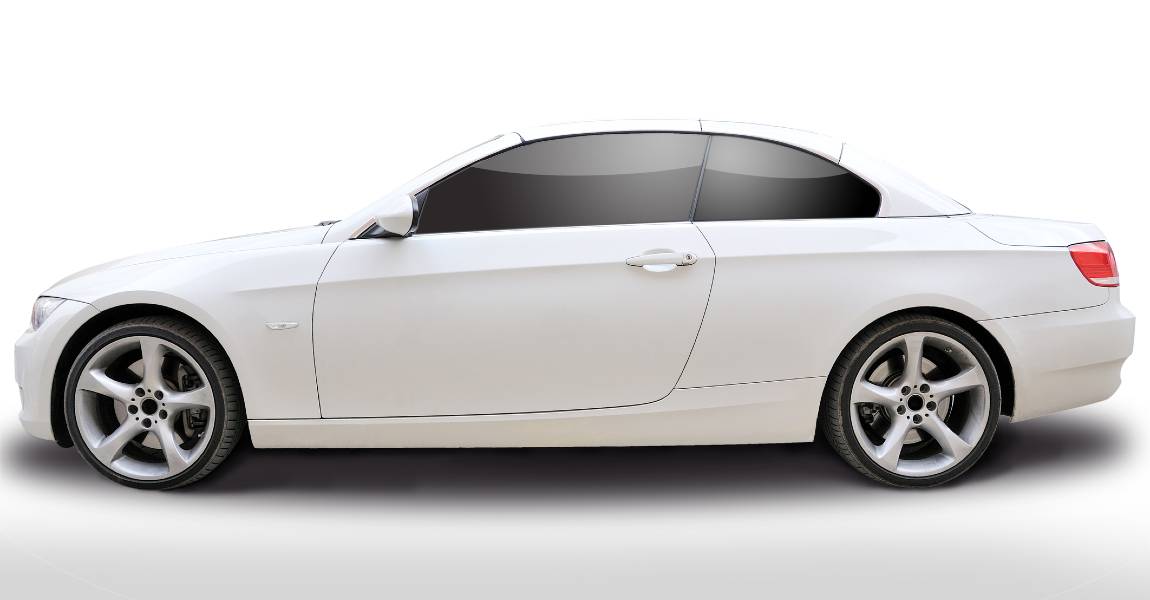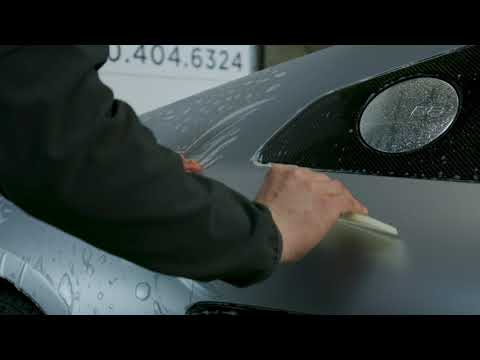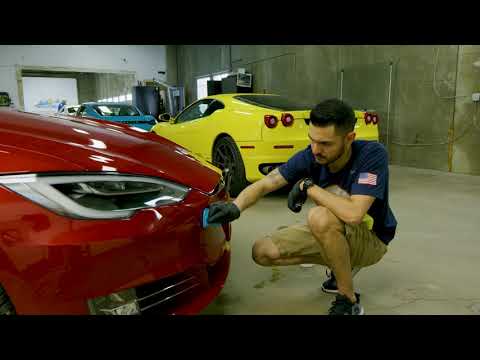What is Carbon Window Tint? Carbon window tint for vehicles is a type of window film made with carbon particles infused into the film material. This type of window tint is known for its high heat rejection properties and ability to block harmful UV rays.
Carbon window tint also provides privacy by reducing visibility from the outside while still allowing for good visibility from the inside. It is a popular choice for those looking to enhance the appearance of their vehicles while also improving the comfort and protection of the interior.

- Benefits of Carbon Window Tinting
- Types of Window Tint Films
- What is the Cost of Different Types of Tint?
- What are the Main Features of Carbon Window Film?
- Carbon Window Tint Installation
- FAQ’s
- Conclusion
Benefits of Carbon Window Tinting
Carbon window tinting offers several benefits, including reducing heat and glare from the sun, protecting the interior of a vehicle from ultraviolet light, and enhancing privacy. Carbon tinting can also improve the aesthetic appeal with its sleek and beautiful appearance.
Carbon window tinting offers several benefits, such as:
- Infrared Light Protection
- Improved Privacy
- Level of Protection
- Affordable Option
- Air Conditioning Efficiency
- Heat Reduction
Infrared Light Protection
Carbon window tinting provides excellent protection against harmful infrared radiation rays from the sun. These rays can cause skin damage and fading of furniture and upholstery.
Improved Privacy
Carbon window tint film reduces visibility from outside, giving you enhanced privacy and security. It allows you to enjoy your personal space without worrying about prying eyes.
Level of Protection
Carbon window tinting offers a high level of protection by blocking up to 99% of harmful UV rays. This helps to protect your skin from sunburn and reduces the risk of skin cancer.
Affordable Option
Carbon window tinting is a cost-effective solution compared to other tinting options. It provides many benefits at a reasonable price, making it a popular choice for both residential and commercial applications.
Air Conditioning Efficiency
Carbon window tinting helps to regulate the temperature inside your car or building by reducing heat transfer. It blocks significant solar heat, allowing your air conditioning system to work more efficiently and reducing energy consumption.
Scorching Heat Protection
Carbon window tinting provides excellent heat rejection, keeping your car’s interior cooler even in scorching heat. This improves comfort and reduces the need for excessive air conditioning, saving energy and money.

Types of Window Tint Films
There are multiple types of carbon window tint, including dyed carbon film, carbon ceramic film and hybrid carbon film, each offering different levels of heat rejection, UV protection, and glare reduction.
Here are some different types of window tinting:
- Dyed tint is a type of carbon window tint that uses a layer of dyed film to block out the sun’s rays. It is an affordable option that provides basic heat and UV protection, but it may fade over time and may not be as effective in blocking out heat as other types of carbon window tint.
- Metalized window tint is another type of carbon window tint that has a layer of metalized window film. This film reflects heat and UV rays, providing better heat rejection and UV protection compared to non-metallic, dyed material. However, it may interfere with electronic signals and may have a slightly darker appearance.
- Ceramic window tint is a high-quality type of carbon tint film that blocks heat and UV rays without affecting electronic signals. It also provides a clear and non-reflective appearance, making it a popular choice for luxury vehicles.
- Nano Carbon tint is a type of window tint that consists of a layer of carbon particles and a polyester film. It offers good heat rejection, excellent UV protection, and a sleek appearance. It is also known for its durability and resistance to fading.
- Hybrid tint combines two or more types of window tint, such as dyed and metalized films, to provide benefits. This can include better heat rejection, UV protection, and a range of tint shades.
- Crystalline tint is a high-performance carbon window tint using multi-layer optical film technology. It offers superior heat rejection, UV protection, and clarity. It provides a nearly invisible appearance, allowing maximum visibility and a stylish look.
What is the Cost of Different Types of Tint?
The cost of different types of tint can vary depending on factors such as:
- Quality of window tint
- Type of film or Tint (such as ceramic window tint or ceramic film) and the benefits of window tinting.
While ceramic window film tint may be more expensive than other types, it offers superior heat rejection and UV protection, making it a worthwhile investment for those seeking high-quality window tint.
On the other hand, economical window tint film options may be more affordable, but they may offer a different level of performance and longevity than higher-priced tints.
How Much Does Car Window Tint Cost? Prices for car window tint can range from around $100 for essential tint options to $500 or more for premium and ceramic window tinting.
What are the Main Features of Carbon Window Film?
- UVA/UVB Protection
- Superior Heat Reduction
- Advanced Technology for Cell Phone Signal Reception
- Radio Signal
- Enhanced Privacy and Security
- Glare Reduction
- Fade Protection
UVA/UVB Protection
- Carbon tints provide excellent protection against harmful ultraviolet (UV) rays from the sun.
- They block up to 99% of UV rays, reducing the risk of skin cancer, premature aging, sun fading, and other sun-related damages.
Superior Heat Reduction
- Carbon tints can significantly reduce solar heat inside the vehicle by blocking solar heat gain.
- This helps to keep the interior cooler, reducing the need for excessive air conditioning usage and saving energy.
- It also enhances the overall comfort of passengers by minimizing hot spots and temperature fluctuations.
Advanced Technology for Cell Phone Signal Reception
- Carbon tints do not interfere with cell phone signal reception, unlike other tinting options.
- They are designed with advanced technology that allows for seamless transmission of signals, ensuring uninterrupted connectivity.
- This is particularly beneficial for individuals relying on their cell phones for navigation, communication, and other driving purposes.
Enhanced Privacy and Security
Carbon tints provide a high level of privacy by reducing the visibility into the vehicle from the outside.
This can help protect personal belongings and deter potential theft or break-ins.
It also adds an extra layer of security for passengers, as it makes it more difficult for outsiders to see inside the vehicle.

Resistance to Glare
- Carbon tints effectively reduce annoying glare from the sun, headlights, and other sources of bright light.
- This improves visibility for the driver, reducing eye strain and enhancing safety on the road.
Fade Protection and Color Stability
- Carbon tints help to protect the interior of the vehicle from fading and color stability caused by prolonged exposure to sunlight.
- They block out harmful ultraviolet rays that can cause damage to upholstery, dashboard, and other surfaces, preserving the aesthetic appeal and value of the vehicle.
Carbon Window Tint Installation
If you’re looking for a sleek and efficient way to enhance your vehicle’s appearance and protect its interior, consider carbon window tint installation today. Carbon window tint offers superior heat rejection, UV protection, and reduced glare, making it a popular choice among car owners.
FAQ’s
1. How long does Carbon Window Tint last?
The lifespan of carbon window tint depends on various factors, such as the quality of the film, installation technique, and window tint maintenance. However, on average, carbon window tints can last 5 to 10 years. Regular cleaning and avoiding harsh chemicals can help prolong its longevity.
2. Is Carbon Window Tint legal?
The legality of tinted vehicle windows varies by jurisdiction. It is essential to check your local window tint laws and regulations regarding the permissible tint darkness levels for car. In many places, a certain percentage of visible light transmission (VLT) is allowed, typically ranging from 20% to 70%, with lower percentages indicating darker tints.
3. Does carbon-tinted windows interfere with electronic devices?
Carbon tint is designed to be non-metallic, which means it does not interfere with electronic devices such as GPS, cell phones, or radio reception. Unlike some metallic tints, carbon window tint allows for uninterrupted connectivity and functionality of these devices.
4. Can Carbon Window Tint be removed?
Yes, carbon window tint can be removed if needed. Professional tinting companies have the expertise and tools to safely remove the tint without damaging the glass. However, it is recommended to consult a professional to ensure proper removal and avoid any potential damage.
Statistics: The time required to remove carbon window tint can vary depending on factors such as the quality of the tint and the adhesive used. On average, removing tint from a car can take around 2 to 4 hours.
5. Does Carbon Window Tint affect visibility?
No, Carbon Window Tint does not significantly affect visibility. It offers optical clarity and visibility during the day and at night. However, it is important to choose the appropriate darkness level that complies with the legal limits and does not impair visibility.
Conclusion
In conclusion, Carbon Window Tint is a type of window film that offers numerous benefits, including heat and UV protection, increased privacy, and enhanced aesthetics for vehicles and buildings.
If you are interested in getting Carbon Window Tint installed, contact Colorado Clear Bra for professional and reliable service. They specialize in window tinting and other protective solutions for your vehicle.
Take the next step in improving your comfort and style by contacting Colorado Clear Bra today.




